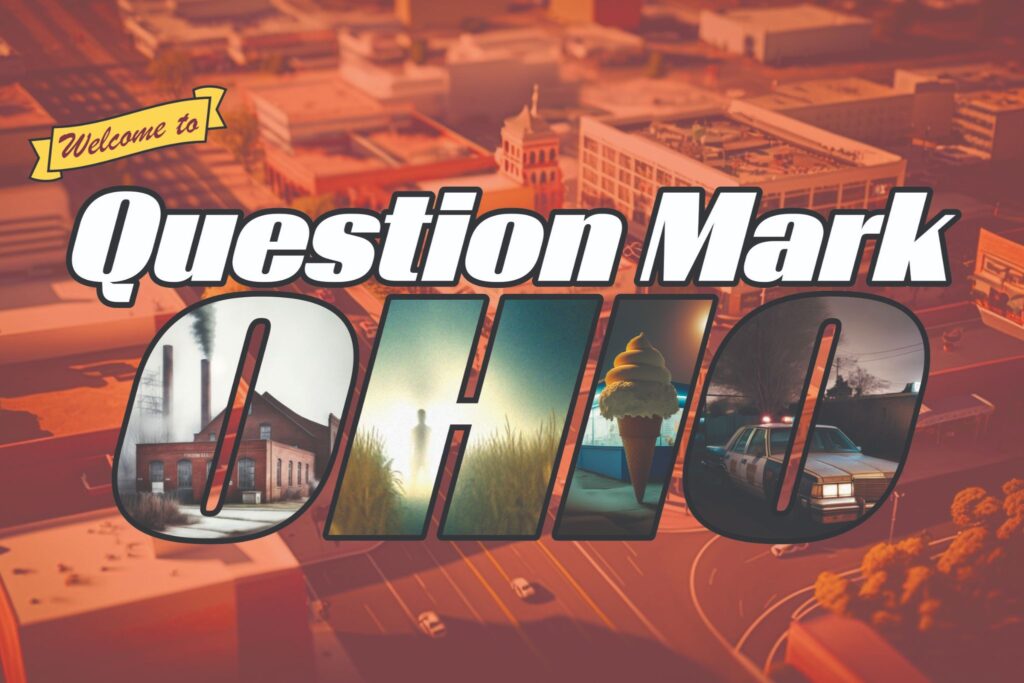
I’ve long followed the work of both Joe Meno and Dan Sinker — the former via his numerous books, the latter via his work as a writer and editor. So when an email showed up in my inbox with the news that Meno and Sinker were collaborating on a new project, Question Mark, Ohio, I was intrigued. The project, a serialized narrative about an Ohio town where objects are mysteriously disappearing, kicks off today on Instagram, with further updates taking place beginning on April 25. I spoke with Meno and Sinker about the project’s genesis, their collaboration, and the art of the narrative.
This was your first time collaborating in 15 years. Was your previous collaboration Punk Planet-related, or something totally different?
Dan Sinker: We’ve done a handful of readings together, but the daily collaboration that was Punk Planet, that was over with the magazine. Stepping back into collaborating closely with Joe has been a dream. I think both of us have said some variation of “It’s rare that you can just jump in right where you left off after 15 years” but it’s true. From the moment we got going, it felt so good to be back.
Joe Meno: There is no one else in the world who could have pulled Question Mark off. Dan has an incredible imagination and his design skills and ability to manage massive logistical problems made him a perfect fit for this. A huge part of the inspiration for this project comes from the Punk Planet years where we were making things we cared about, not because we were concerned about paying a mortgage or looking at sales figures. For me, Question Mark, Ohio is an opportunity to return to that sense of imagination and play, which feels like it’s lacking in parts of our culture right now.
What sparked this particular collaboration?
Sinker: I went to a book release for Joe’s latest novel. Megan Stielstra, a mutual friend of ours was also reading, and I thought it would be fun to see her read and surprise Joe too. Afterward me made a plan to meet and catch up and so we went on this super long walk on a gorgeous warm fall day and after we caught up on the last decade or so of each of our lives, Joe floated an idea: “I want to do a novel, but instead of a book it’s the whole internet” and I was hooked immediately. From there it’s been six solid months of building.
Meno: I had been thinking about this concept for awhile but had no way to move it beyond the initial concept because I do not know how to code, I cannot design, and Dan thinks three steps ahead of everything. We met up one afternoon in November 2022 and started talking about our lives and what we were working on and I realized This is the only person I know who might get this….and then I pitched him a few days later. He came back with these incredible AI images and it was suddenly better than I could have ever imagined.
What was your methodology for collaborating this time out?
Sinker: I feel like we’ve been engaging in a series of escalating dares. Pretty much from the start it’s been one of us saying “I don’t know if it’s possible but…” and the other one going “dunno, let’s try it anyway.” We’re sort of writing rules as we go. Not just rules for the world we’ve built and the people that live there, but rules around how a narrative can work and how readers can engage with it. It’s been really exciting. I sometimes can’t sleep because I’m too busy thinking of how to hook up some new secret to the story.
Meno: We basically send a dozen emails to each other saying, “I know this sounds crazy. What if we hid something here? Or built a secret website for this…” It’s rare you get to work with someone who’s willing to put more work into something then you would…
What about this story lent itself to serialization?
Meno: I’ve been thinking about the internet as a place. I remember in the early 90’s logging on felt like traveling to another dimension. There was that delay and the sound of the modem; it felt like leaving your body and going somewhere else. So I’d been thinking about a town, a place people could go, and interact with the characters and really engage with the story by solving clues themselves, instead of watching a television show or film, which feels much more passive. I think we’re trying to imagine the internet as a place where wonder can still happen.
Question Mark, Ohio is scheduled to last for a year. What were some of the challenges of working on a project with a relatively finite structure?
Meno: First and foremost, Question Mark, Ohio is a story and for a story to work it needs to have a beginning, middle, and end. Some of the problems I’ve seen with serialized television shows or the Marvel movies is this sense that there is no arc, and those kinds of properties are just reproducing themselves over and over without any sense of direction. We want Question Mark to engage readers, to be a place people can come back to, to explore, but for it to have meaning, it has to end.
We are in living in an era, in a culture, where almost nothing seems to end. The same recurrent political battles, the same pop culture references, there is something important and beautiful about things ending. In some ways, the whole project is about negotiating living in a world of uncertainty and accepting whatever happens, including the end of the people, places, and things we love.
Follow Vol. 1 Brooklyn on Twitter, Facebook, and sign up for our mailing list.
